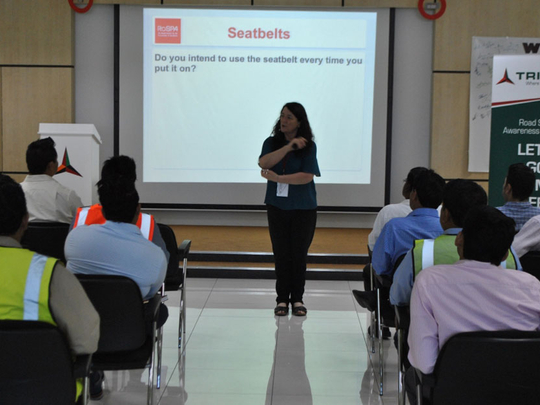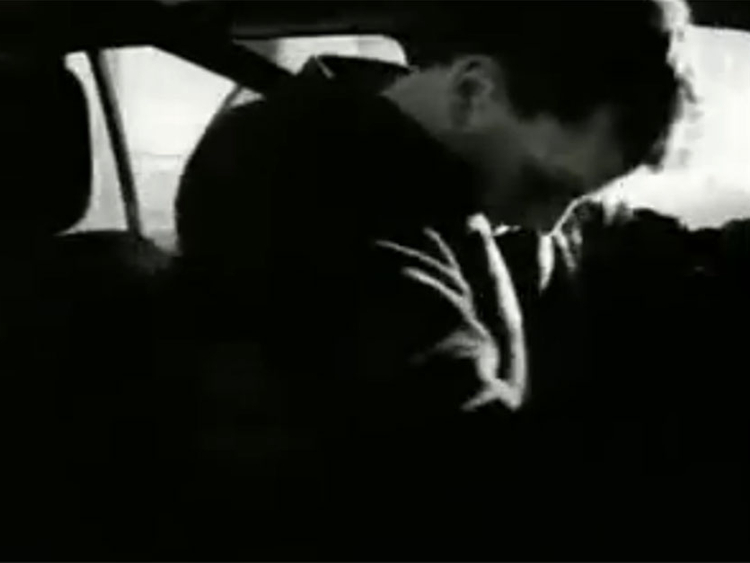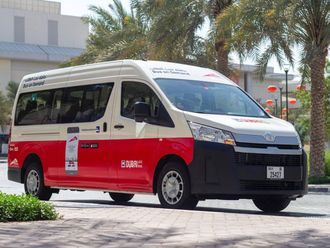
Dubai: An accident-prevention expert said UAE roads are "dangerous" as people not only drive “very fast, very close to each other” but are also distracted due to deadly mobile phone use while driving.
This need not be the case with greater driver safety awareness and zero mobile phone usage behind the wheel, said Mary Loffman, a senior training consultant of the Royal Society for the Prevention of Accidents (RoSPA), a UK safety industry organisation based in Birmingham.
“What’s important (to road safety) is the culture of mobile phone use (while driving). In general, the distraction that mobile phones causes drivers is quite significant,” said Loffman, who was on a six-day visit to the UAE giving road safety lectures in schools and conducting training sessions for professional drivers.
RoSPA’s advice is to switch off the phone completely while driving. RoSPA has been working for nearly 100 years to change both legislation and attitudes surrounding accidents in the UK.
Besides road safety, it also deals with prevention of accidents in oil rigs, industrial and commercial settings.
“Not even putting your phone on silent mode, or using hands-free set will help. Even the conversation itself can distract the driver and make them miss something very important," she said.
"We reckon the percentage of fatalities caused by mobile phone use is quite high here. We do understand that we can’t change things overnight but we do want to make people aware of the dangers,” Loffman said.
Seat-belts
Moreover, not wearing seatbelt -- sometimes in the front seat, but particularly in the rear seat – is prevalent too, she said.
“It seems parents want to protect their children in many other ways, but when it comes to protecting them while inside a running vehicle, they seem to be unaware of the dangers that can be caused by not wearing a seatbelt,” she added.
'At less than 50kph, if the a driver breaks hard, a passenger without wearing a seatbelt can be the same force as a baby elephant 3.5 tonnes in weight.'
To demonstrate the force with which an unrestrained back seat passenger can be thrown forward in a car accident, she said: “At less than 50kph, if the a driver breaks hard, a passenger without wearing a seatbelt can be the same force as a baby elephant 3.5 tonnes in weight.”
“When a parent picks up child from school, and the child sits in the back and the parent suddenly breaks, the child could end up killing their own parent from the impact. This sounds dramatic, but this is scientifically proven. So I ask people on the road today to always buckle up – whether they are in front or in the rear.”
Loffman visited a number of UAE schools, talking to teenage students -- some of whom are already driving -- but mostly coming up to driver’s age.
“We’re preparing them for understanding the consequences of how distractions can cause fatalities on the road,” she said.
The training programme is part of a CSR initiative of Dubai-based liquid logistics company Tristar.
As part of this week’s programme, Loffman met more than 400 teenage students and hundreds of corporate people who are current drivers.
Fact File
-
1 person is killed every 48 hours in traffic accidents, and one person is injured every four hours in Dubai, according to Dubai Police
-
Road accidents are believed to be the No. 2 killer after cardiovascular diseases in the UAE
-
Use of mobile phones while driving is among the top five causes of accidents in Saudi Arabia
-
Approximately 1.24 million deaths occur annually on the world’s roads, according to WHO
-
Road traffic injuries are among the top 10 leading causes of death and are now a global public health problem
-
Road accidents are also the No. 1 cause of death among those aged 15 - 29 years
- UN General Assembly adopted a resolution in 2010 calling for a Decade of Action for Road Safety 2011 - 2020
-
WHO reports that the eastern Mediterranean region has the second-highest number of road traffic deaths in the world after the African region
- The Gulf Cooperation Council (GCC) road safety record is shows a very high road fatality ratio as compared to many parts of the world.
When driving, remember these...
Attitude – avoid drink driving completely, speeding and mobile phone use, swear seatbelt
Concentration and distraction – Avoid thoughts or conversations that can distract driver’s attention from the road
Observation – Be aware of your surroundings and avoid being too close to the vehicle in front. Extend observation field to a greater distance and surrounding area, to help you plan ahead
Space – Become spatially aware in front, behind and to the sides so you’re seeking out hazards and dangers.
Time – Allow the right amount of space and time (to avoid accidents); RoSPA suggests that drivers must observe the three-second rule (before hitting an object)
Source: RoSPA













